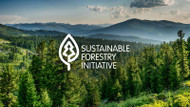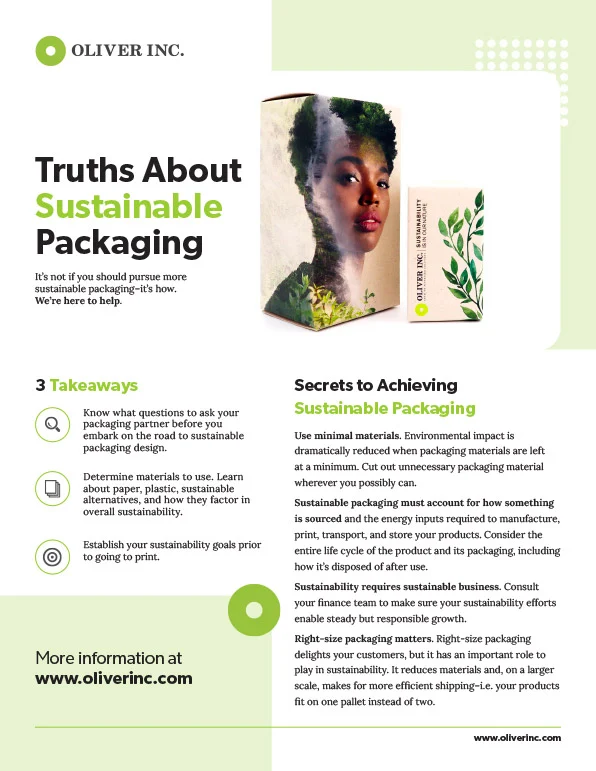What Is SFI-Certified Packaging?
Posted by Oliver Inc. on 16th Nov 2023
There’s a lot that goes into figuring out whether your supply chains, warehouses, and distribution channels are sustainable or perpetuating wasteful business practices of the past.
Tracking down every input and output in your system, while trying to appeal to the expanding number of consumers demanding more environmentally friendly products, can discourage you from becoming an industry leader committed to a greener future.
And it can take a great deal of labor and resources to ensure your packaging is sustainable.
Fortunately, working with a packaging supplier with sustainability certifications simplifies that process for you—granting assurance that your brand takes its environmental responsibility seriously.
Consumers will reward you with brand loyalty when they notice your packaging features a label from a sustainability certification organization such as the Sustainable Forestry Initiative.
Why SFI-Certified Packaging Matters
Climate change remains a top global concern among 19 countries, according to an August 2022 survey conducted by the nonpartisan think tank Pew Research Center. This bundle of issues includes not only anthropogenic climate change due to greenhouse emissions, but deforestation, pollution, and mass extinction that result from unethical business practices and supply chains.
Our natural environments are under threat due to overconsumption, irresponsible management of forests, and over-extraction of minerals, elements, and other natural resources by industry. Packaging suppliers and brands who rely on these resources to protect their products during shipment and storage are certainly not off the hook, either.
To help businesses and consumers limit their ecological footprint and transition toward more sustainable practices, various entities have sprung up, such as the Sustainable Forestry Initiative (SFI).
Founded in 1994, SFI is an independent, nonprofit organization dedicated to advancing sustainability through responsibly managed forests. SFI collaborates with foresters, brand owners, conservation groups, resource professionals, landowners, educators, local communities, Indigenous Peoples, governments, and universities to counteract environmental threats.
Printing and packaging suppliers and their clients are responding to these environmental concerns by integrating SFI-certified paper products into their packaging design. Not only is this helping undo decades of harmful business practices, but it's enabling them to connect with a growing number of eco-conscious consumers.
Those who embrace sustainability are able to grow their brands while having a more positive ecological impact on the communities in which they operate.
SFI-Certified Packaging Explained
SFI’s work centers around a large copse of standards for forest management, fiber sourcing, and chain of custody, among others. Each includes associated principles, objectives, and performance measures aimed to guide organizations and businesses toward more sustainable processes.
For instance, while the forest management standards feature measures to protect water quality, biodiversity, wildlife habitat, threatened and endangered species and forests with so-called “exceptional conservation value,” chain of custody standards monitor the amount of a paper product that comes from certified lands, recycled content, and non-certified content.
Forest Management Standard Principles
To become a SFI-certified organization, forest managers and timber producers must embrace stewardship responsibilities that reflect a commitment to sustainably managed forests. This includes abiding by 13 principles:
- Sustainable Forestry - harvesting trees for paper products while promoting the ability of future generations to do the same in a way that conserves soil, air and water quality and quantity, climate change adaptation and mitigation, biological diversity, wildlife and aquatic habitats, recreation, and aesthetics.
- Forest Productivity & Health - improving the long-term health of forests and protecting them from economically, environmentally, or socially undesirable impacts.
- Protection of Water Resources - maintaining water quality and quantity of water bodies and protecting riparian areas.
- Protection of Biological Diversity - managing forests in ways that promote biological diversity among plants, animals, and habitats, with special attention to culturally and ecological important species.
- Aesthetics & Recreation - providing recreational opportunities and visual beauty for the public.
- Protection of Special Sites - overseeing culturally and geologically significant lands with respect to their unique qualities.
- Legal Compliance - complying with local, state, and federal laws that pertain to environmental regulations.
- Research - Bolster advancements in sustainable forest management via research, science, and technology.
- Training & Education - furthering sound forestry through training and education.
- Community Involvement & Social Responsibility, & Respect for Indigenous Rights - practicing sustainable forestry includes community involvement, especially through recognition and respect of Indigenous Peoples’ rights and traditional forest-related knowledge.
- Transparency - broadening understanding of forest certification by documenting certification audits and making results publicly available.
- Continual Improvement - steadily enhancing the practice of sustainable forest management and reporting performance.
- Responsible Fiber Sourcing - employing and advocating for sustainable forestry practices in the United States and Canada.
Becoming a SFI-Certified Packaging Supplier
Many printing and packaging suppliers employ both SFI-certified and non-certified paper sources, leaving the choice up to client preferences. In other words, packaging suppliers don’t often have their own forests they manage, but rather source timber products from elsewhere. When clients request SFI-certified paperboard for their projects, packaging suppliers will provide it.
Audits are conducted by accredited third-party inspectors who conduct onsite assessments of forests to determine the quality of forest management against SFI standards. Mills and manufacturers seeking SFI certification must demonstrate that the raw timber materials in their supply chains come from responsible sources.
Once a paper manufacturer has been certified by independent third-party auditors, SFI labels are adhered to fiber denoting that it’s been sourced responsibly.
Notably, SFI is focused on forests and paper manufacturers in the United States and Canada. So when timber products are sourced from outside North America, in countries with less strict environmental laws, they undergo further risk assessments to demonstrate their timber comes from sustainably managed forests that promote conservation, biodiversity, and avoid illegal logging.
SFI-certified packagers incorporate certified paperboard into their packaging design options, across wide-ranging industries, from food and beverage and health and beauty to cannabis, pharmaceuticals, and consumer goods.
Working With an SFI-Certified Packaging Supplier
In most cases, it’s pretty easy to identify whether a packaging supplier is SFI certified, or not. Given how much time and resources it takes a company to become (and remain) SFI certified, sustainable packaging firms will feature their certification fairly prominently on their website.
When you work with a sustainable packaging partner such as Oliver, you can expect a commitment to environmental stewardship to show up in a few other obvious ways as you become more acquainted.
For instance, Oliver embraces right-sized packaging principles, a design approach that utilizes only as much packaging materials as is needed to protect and secure your products throughout storage, shipping, and display on store shelves.
In addition to employing SFI-certified paperboard, we also integrate post-consumer recycled paper and other renewable paperboard alternatives into our substrates.
And we’re a domestic packaging supplier, so that means our supply chains are localized to minimize our carbon footprint, to not only help you become more sustainable as a company, but enabling you to keep a closer eye on your packaging project. That’s abundant peace of mind for companies trying to do right by their eco-conscious consumers and stakeholders.
Adopting SFI-certified packaging is but one step toward achieving your sustainability goals, but it’s an important one, and we’re more than happy to help you realize them.






